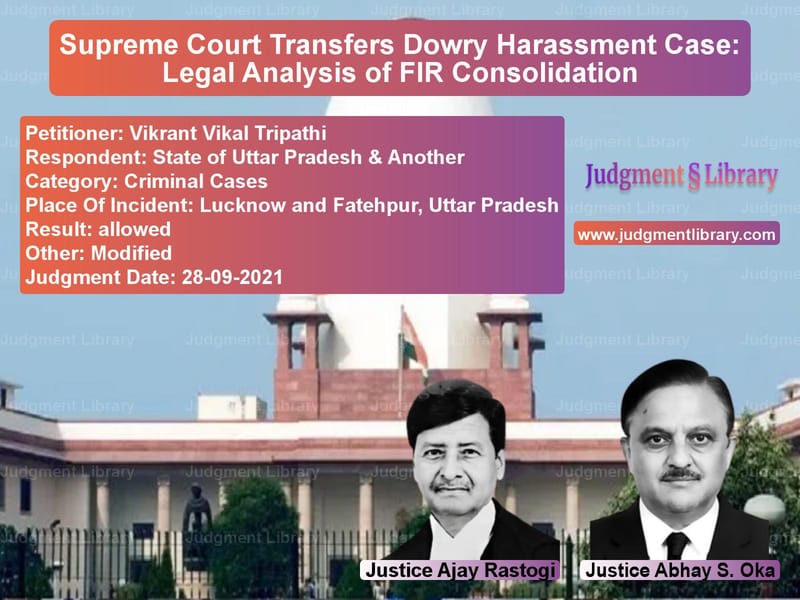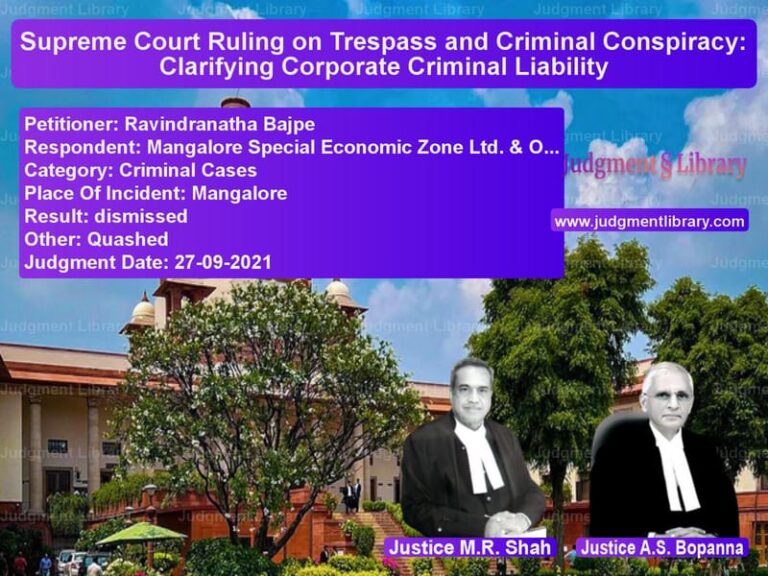Supreme Court Transfers Dowry Harassment Case: Legal Analysis of FIR Consolidation
The present case involves an appeal filed by Vikrant Vikal Tripathi challenging the order of the Allahabad High Court, Lucknow Bench, which had rejected his application for the transfer and consolidation of two FIRs filed against him by his estranged wife. The Supreme Court was tasked with determining whether the transfer of one FIR to another district and its consolidation with an existing case was justified.
The case raises important legal questions regarding jurisdiction in matrimonial disputes, the interpretation of procedural laws in multiple FIR cases, and the rights of the accused in dowry-related offenses.
Background of the Case
The appellant, Vikrant Vikal Tripathi, was facing criminal charges in two separate FIRs filed by his estranged wife:
- FIR No. 80/2013, registered on April 29, 2013, at Police Station Talkatora, Lucknow, Uttar Pradesh, under Sections 498-A, 323, 504, 506 of the Indian Penal Code (IPC) and Sections 3/4 of the Dowry Prohibition Act.
- FIR No. 289/2013, registered on July 1, 2013, at Police Station Kotwali, Fatehpur, Uttar Pradesh, under similar charges, including an additional charge under Section 342 and Section 494 IPC.
The appellant contended that since both cases arose from the same matrimonial dispute, they should be tried together in the same court to avoid inconsistent rulings and procedural hardships.
Legal Issues Considered
- Whether the two FIRs, arising from the same matrimonial dispute, should be consolidated.
- Whether the transfer of FIR No. 80/2013 from Lucknow to Fatehpur was justified.
- Whether the procedural safeguards under criminal law were adequately followed.
- The impact of multiple cases on the accused’s right to a fair trial.
Arguments by the Appellant
- The appellant argued that both FIRs originated from the same dispute and should be tried together to prevent contradictory judgments.
- The criminal charges under the Dowry Prohibition Act and IPC sections were largely identical in both FIRs, warranting their consolidation.
- The continued trial in two separate courts placed undue hardship on him and violated the principle of judicial economy.
- He was willing to cooperate with the trial but sought a fair procedure where both cases could be adjudicated simultaneously.
Arguments by the Respondent
- The respondent (estranged wife) did not appear before the Supreme Court despite being duly served with notice.
- The prosecution maintained that both cases should proceed independently since they were filed in different districts.
- The respondent’s counsel contended that consolidating the FIRs might affect the independent adjudication of each case.
Supreme Court’s Observations
The Supreme Court, comprising Justices Ajay Rastogi and Abhay S. Oka, carefully examined the factual matrix and legal principles governing FIR consolidation and transfer of criminal cases.
- The Court noted that both FIRs stemmed from the same matrimonial discord, involving identical charges under the Dowry Prohibition Act and IPC.
- Allowing two separate trials in different jurisdictions could lead to inconsistent verdicts, procedural delays, and an undue burden on the accused.
- The respondent’s absence before the Supreme Court suggested a lack of opposition to the transfer and consolidation of cases.
- The Court emphasized that judicial economy and the right to a fair trial necessitated consolidating the cases.
Final Judgment
The Supreme Court allowed the appeal and passed the following directives:
- FIR No. 80/2013 registered at Police Station Talkatora, Lucknow, was transferred to the jurisdiction of the Civil Judge, Junior Division, Fatehpur.
- Both FIRs (80/2013 and 289/2013) were to be tried together in the same court.
- The appellant was directed to appear before the trial court on October 1, 2021, to record his presence.
- The trial court was instructed to expedite the proceedings and ensure a timely conclusion of the trial.
Conclusion
This judgment underscores the Supreme Court’s commitment to ensuring procedural fairness in criminal cases, particularly in matrimonial disputes. By consolidating the FIRs, the Court ensured that justice was served efficiently without placing undue burden on the accused or the judicial system.
Read also: https://judgmentlibrary.com/supreme-court-revokes-bail-in-murder-case-a-detailed-legal-analysis/
The ruling also reinforces the principle that multiple FIRs arising from the same transaction should be tried together to avoid inconsistent judgments and procedural hardships. This decision will serve as a precedent in similar cases where multiple criminal complaints arise from a single matrimonial dispute.
Petitioner Name: Vikrant Vikal Tripathi.Respondent Name: State of Uttar Pradesh & Another.Judgment By: Justice Ajay Rastogi, Justice Abhay S. Oka.Place Of Incident: Lucknow and Fatehpur, Uttar Pradesh.Judgment Date: 28-09-2021.
Don’t miss out on the full details! Download the complete judgment in PDF format below and gain valuable insights instantly!
Download Judgment: vikrant-vikal-tripat-vs-state-of-uttar-prade-supreme-court-of-india-judgment-dated-28-09-2021.pdf
Directly Download Judgment: Directly download this Judgment
See all petitions in Dowry Cases
See all petitions in Bail and Anticipatory Bail
See all petitions in Judgment by Ajay Rastogi
See all petitions in Judgment by Abhay S. Oka
See all petitions in allowed
See all petitions in Modified
See all petitions in supreme court of India judgments September 2021
See all petitions in 2021 judgments
See all posts in Criminal Cases Category
See all allowed petitions in Criminal Cases Category
See all Dismissed petitions in Criminal Cases Category
See all partially allowed petitions in Criminal Cases Category







